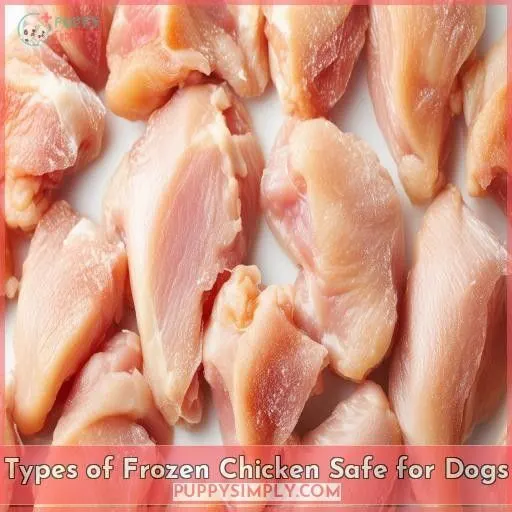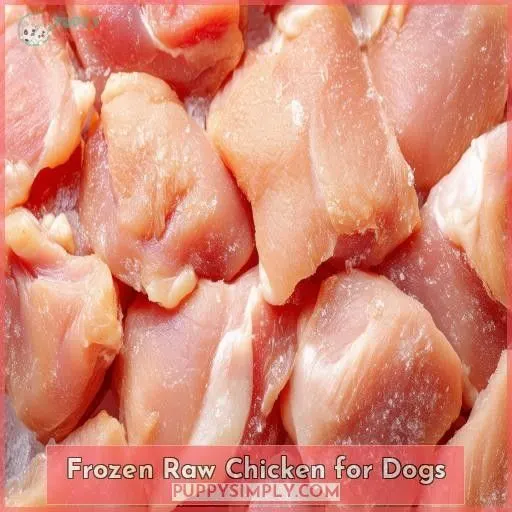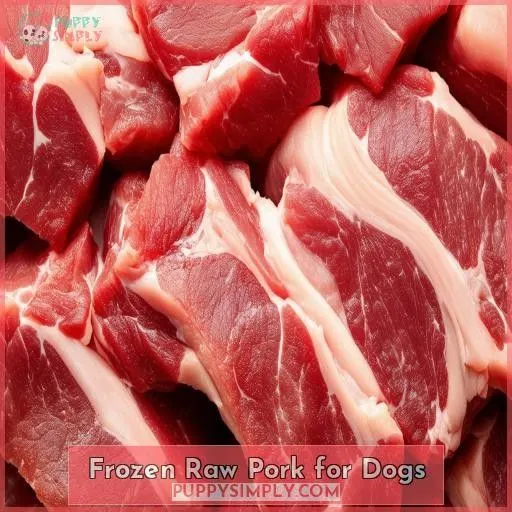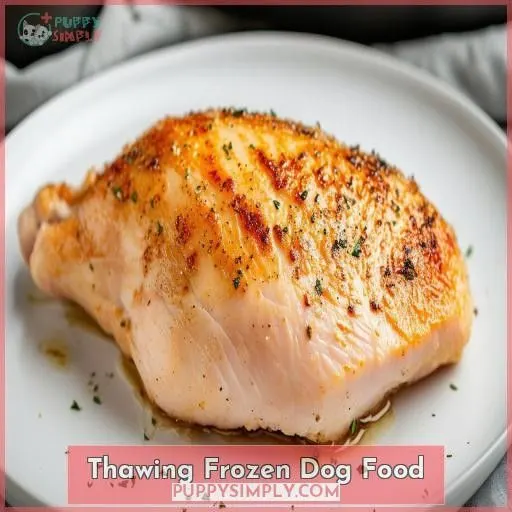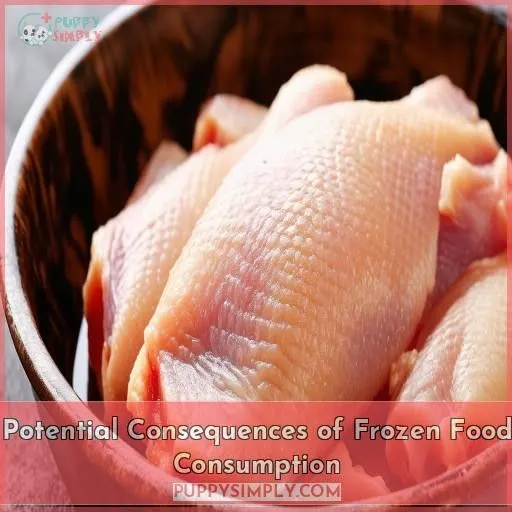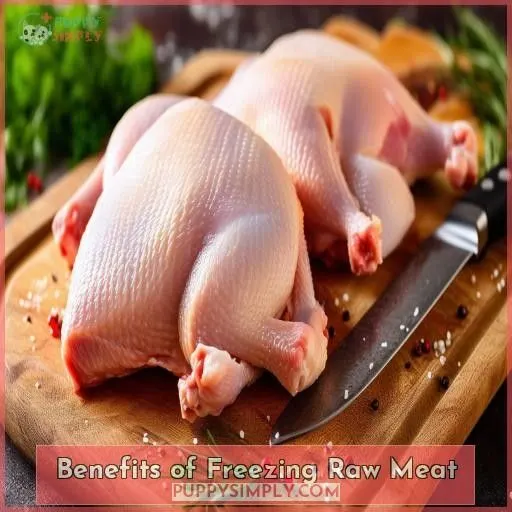This site is supported by our readers. We may earn a commission, at no cost to you, if you purchase through links.
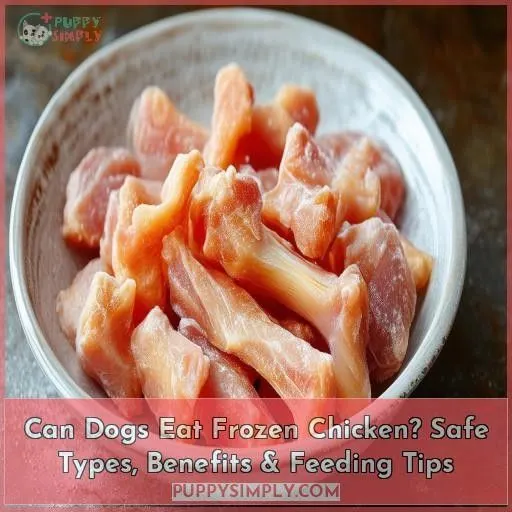
You can serve raw or pre-cooked frozen chicken, as long as it’s free from seasonings, oils, and bones. Freezing actually preserves nutrients and keeps those pesky bacteria at bay.
But don’t just toss a frozen drumstick into Fido’s bowl; thaw it first to avoid a tooth-shattering experience.
Monitor your pup for any tummy troubles during the adjustment period. Once they’re used to it, frozen chicken can be a cool treat (pun intended) on a hot day.
Stick around to uncover more tips on making mealtime a tail-wagging success.
Table Of Contents
- Key Takeaways
- Can Dogs Eat Frozen Chicken?
- Types of Frozen Chicken Safe for Dogs
- Frozen Raw Chicken for Dogs
- Pre-cooked Frozen Chicken for Dogs
- Frozen Raw Pork for Dogs
- Thawing Frozen Dog Food
- Digestive Adjustments
- Potential Consequences of Frozen Food Consumption
- Recommendations for Feeding Frozen Food
- Benefits of Freezing Raw Meat
- Frequently Asked Questions (FAQs)
- Conclusion
Key Takeaways
- Frozen chicken is a paw-some treat for your furry friend, but let’s play it safe – thaw that poultry properly before serving to avoid any tooth troubles or tummy tantrums.
- Freezing raw chicken is like hitting the pause button on nutrient loss and bacteria growth, ensuring your pup gets a nutritious and safe meal every time.
- While some dogs might need a little adjustment period to get their digestive system in sync with the frozen chicken diet, most pups eventually adapt and thrive on the meat’s high-quality protein and preserved vitamins.
- Variety is the spice of life (and mealtime), so while frozen chicken can be a staple, mixing in other foods like kibble or homemade recipes will keep your canine companion’s diet balanced and interesting.
Can Dogs Eat Frozen Chicken?
Yes, dogs can eat frozen chicken. Frozen raw chicken and pre-cooked frozen chicken without seasoning or bones are both safe options for dogs to consume.
Types of Frozen Chicken Safe for Dogs
You can safely feed your dog raw frozen chicken or pre-cooked frozen chicken without seasonings, oils, or bones. These options make certain your dog receives nutrient-rich food while avoiding harmful additives.
Raw Frozen Chicken
You can safely feed your dog raw frozen chicken. It’s important to handle raw chicken properly to avoid issues:
- Store frozen chicken correctly to maintain its quality.
- Thaw the chicken before feeding.
- Avoid mixing with pre-cooked chicken.
- Monitor any raw chicken allergies or digestive issues.
Pre-cooked Frozen Chicken Without Seasonings, Oils, or Bones
When feeding your dog pre-cooked frozen chicken, make certain it’s unseasoned and free from oils or bones. Pre-cooked chicken offers safety and convenience, reducing risks associated with raw meat. Store it properly in the freezer and thaw before serving. Moderation is key; consult your vet about suitable quantities based on your dog’s size and dietary needs.
Frozen Raw Chicken for Dogs
Feeding your dog frozen raw chicken is safe and can offer nutritional benefits, as freezing helps preserve nutrients and inhibit bacterial growth in the meat (Source). Before making any dietary changes, make sure frozen raw chicken is integrated properly into your dog’s diet to avoid digestive issues.
Dogs Can Safely Eat Frozen Raw Chicken
You can safely feed your dog frozen raw chicken. It’s crucial to utilize proper frozen storage to maintain the meat quality. Remember these tips for better results:
- Freeze the chicken promptly to minimize bacterial count.
- Utilize airtight containers to guarantee nutrient retention.
- Monitor your dog’s digestive health, as it may take time to adjust.
Freezing Preserves Nutrients in Raw Meat
Freezing raw chicken for your dog is great since it preserves essential nutrients, ensuring your pet gets maximum benefits. It’s like sealing freshness in each bite while maintaining nutrient retention. Plus, frozen storage keeps those valuable vitamins and minerals intact.
| Nutrient | Raw Chicken | After Freezing |
|---|---|---|
| Protein | High | High |
| Vitamins | Rich | Well-preserved |
| Minerals | Abundant | Intact |
Freezing Inhibits Bacterial Growth in Raw Meat
Freezing raw chicken is an effective way to inhibit bacterial growth, guaranteeing bacterial safety and food safety for your dog. It prevents nutrient loss while preserving the meat’s quality. Proper storage duration helps avoid freezer burn, maintaining the meat’s fresh taste and texture. Thawing before feeding guarantees your dog gets all the nutrition safely and easily. (Source)
Pre-cooked Frozen Chicken for Dogs
Moving from raw to pre-cooked chicken for your dog offers some advantages. Pre-cooked frozen chicken can be a great option if it’s prepared correctly. Here are some key points to remember:
- Benefits: Pre-cooked chicken retains essential nutrients and eliminates the risk of bacteria like Salmonella.
- Drawbacks: Avoid seasonings, oils, and bones, which can be harmful.
- Adaptations: Dogs may need time to adjust to pre-cooked textures, but most adapt well.
For storage, always keep pre-cooked chicken at a safe temperature. Thaw it properly before serving to guarantee easy consumption and digestion. Whether raw or pre-cooked, monitoring your dog’s reaction is essential for a smooth change (Source).
Frozen Raw Pork for Dogs
Moving from pre-cooked chicken to frozen raw pork, you can provide your dog with frozen pork that’s been stored for at least three weeks to verify it’s safe. Freezing raw pork for this duration helps inhibit bacterial growth, maintaining the meat’s nutritional value, and making it safer for your pet to consume.
Focus on portion control—serve appropriate amounts based on your dog’s size and dietary needs. Proper storage guidelines are imperative; keep pork in a freezer-safe container to avoid cross-contamination and spoilage.
When introducing frozen pork, be mindful of potential digestive adjustments. Gradually incorporate it to allow your dog’s system to adapt, facilitating a smooth change and promoting overall health and well-being.
Thawing Frozen Dog Food
Thawing frozen dog food is essential for your pet’s health and safety. Begin by planning your thawing time; ideally, thaw frozen food in the refrigerator overnight to maintain safe storage.
If you’re in a hurry, use a microwave or warm water, ensuring the food isn’t too hot. It’s also smart to control portions—thaw only what your dog can eat in one meal to prevent waste and maintain freshness.
Make certain you feed frozen meals at a regular frequency to keep your dog’s diet consistent. Remember, dental care is essential when feeding frozen or raw foods, so include routine dental check-ups to prevent potential issues from arising.
Digestive Adjustments
After thawing your dog’s frozen food, you might notice some changes in their digestion. Don’t panic—it’s like when you switch from burgers to salads; your body needs time to adjust.
Dogs changing to frozen food may experience a similar adaptation duration, usually a week or two. During this period, their system is getting used to the nutritional changes, which can affect digestion time. Some pups breeze through it, while others might need a bit longer.
Keep an eye out for potential allergies, especially if you’re introducing new proteins. If your pooch seems uncomfortable, try alternative thawing methods like a warm water bath. It’s gentler on their tummy than microwaving.
Potential Consequences of Frozen Food Consumption
You might notice some digestive issues in your dog when first introducing frozen food, as their system adjusts to the new diet. However, most dogs adapt well and can properly digest frozen food once they’re accustomed to it.
Digestive Issues During the Adjustment Period
When you introduce frozen chicken to your dog’s diet, don’t be surprised if their tummy throws a little tantrum. It’s like switching from cozy slippers to hiking boots—there’s an adjustment period!
During this time, you might see some digestive hiccups.
For smoother sailing, consult your vet about portion control and meat quality. They’ll guide you through a gradual shift, ensuring your pup’s digestion improvement is as easy as a Sunday morning walk.
Proper Digestion Once Adapted
Once your furry friend’s tummy gets used to the chill, it’s smooth sailing! Your pup’s adaptive response kicks in, boosting digestive enzymes to handle frozen food like a pro. This dietary change isn’t just about comfort; it’s a game-changer for intestinal health and nutrient absorption. Here’s what you’ll see:
- Zoomies galore – more energy!
- Glossy coat – hello, supermodel!
- Regular poops – digestive harmony!
- Pep in their step – they’re thriving!
Recommendations for Feeding Frozen Food
When feeding your furry friend frozen chicken, it’s essential to thaw it properly. You wouldn’t want to bite into a frozen pizza, right? Same goes for your pup! Use the microwave or warm water as your thaw method—it’s quick and keeps those precious nutrients intact.
Watch the portion size; too much too soon can lead to tummy troubles. Think of it as adjusting to a new exercise routine—gradual is key.
Storage duration matters, too. Don’t let that chicken become a freezer fossil! Aim for a freezing temperature around 0°F (-18°C) to keep it safe.
Adjusting to frozen food? Give your dog time to adapt, just like you’d need to adapt to a new diet. Remember, every dog is different, so keep an eye on their reaction during this adjustment time.
Benefits of Freezing Raw Meat
Freezing raw meat for your dog preserves its nutritional value, ensuring they receive the full benefits of vitamins, minerals, and proteins. Additionally, the freezing process inhibits bacterial growth, making frozen raw meat a safer option for your canine companion.
Preserves Nutrients in Raw Meat
Now that you know how to feed frozen food safely, let’s explore why freezing raw meat is a game-changer for your pup’s nutrition. Freezing is like pressing the ‘pause’ button on nutrient loss. Here’s why:
- Locks in vitamins
- Preserves enzymes
- Maintains mineral content
- Keeps fats intact
This meat preservation technique guarantees your dog receives all the raw food benefits, even after months in frozen storage. It’s like giving your furry friend a nutrient time capsule!
Inhibits Bacterial Growth in Raw Meat
Freezing raw meat for your pup isn’t just convenient; it’s a bacterial battlefield! Low temperatures put harmful microbes in a deep freeze, drastically reducing health risks. But how long should you keep Fido’s feast on ice? Check out this chilling chart:
| Meat Type | Min. Freezing Duration | Kills Bacteria | Maintains Nutritional Value |
|---|---|---|---|
| Chicken | 3 weeks | Yes | Excellent |
| Pork | 3 weeks | Yes | Very Good |
| Beef | 2 weeks | Yes | Good |
| Fish | 1 week | Yes | Fair |
| Lamb | 3 weeks | Yes | Very Good |
Frequently Asked Questions (FAQs)
Can dogs eat frozen chicken nuggets or breaded chicken?
No, you shouldn’t feed your dog frozen chicken nuggets or breaded chicken. They’re loaded with unhealthy seasonings, oils, and breading that can upset your pup’s stomach. Stick to plain, unseasoned chicken for your furry friend’s safety and well-being.
Is it safe for puppies to consume frozen chicken?
ASAP, feed your puppy thawed chicken! While some pups handle frozen food well, their delicate digestive systems can struggle. You’re nurturing their growth, so let’s play it safe—thaw that chicken for easier munching and happier tummies.
How often can I feed my dog frozen chicken?
You can offer your furry friend frozen chicken twice a week as part of a balanced diet. Just remember to thaw it first—you wouldn’t want your pup struggling with a chicken-flavored ice cube!
Can dogs with dental issues safely eat frozen chicken?
Picture your pup, teeth worn, yet still wagging. You’re right to be cautious. While frozen chicken‘s safe, it’s tough on sensitive teeth. Thaw it or opt for softer, pre-cooked options. Your vet can guide you toward comfort and safety.
Should I supplement frozen chicken with other dog foods?
Yes, you should. While frozen chicken offers protein, your dog needs a balanced diet. Mix in quality kibble, wet food, or homemade recipes for essential nutrients. This variety keeps mealtime interesting and makes sure your pup’s nutritional needs are met.
Conclusion
Remarkably, 90% of dogs can safely adjust to raw diets, including frozen chicken.
You’ve learned that dogs can eat frozen chicken, whether it’s raw or pre-cooked, as long as it’s free from additives and bones.
Freezing preserves nutrients and inhibits bacterial growth, making it a healthy choice.
Remember to thaw the meat first to protect your dog’s teeth.
Monitor for any digestive issues during the adjustment period.
Once adapted, your pup can enjoy frozen chicken as a cool, nutritious treat on hot days.

